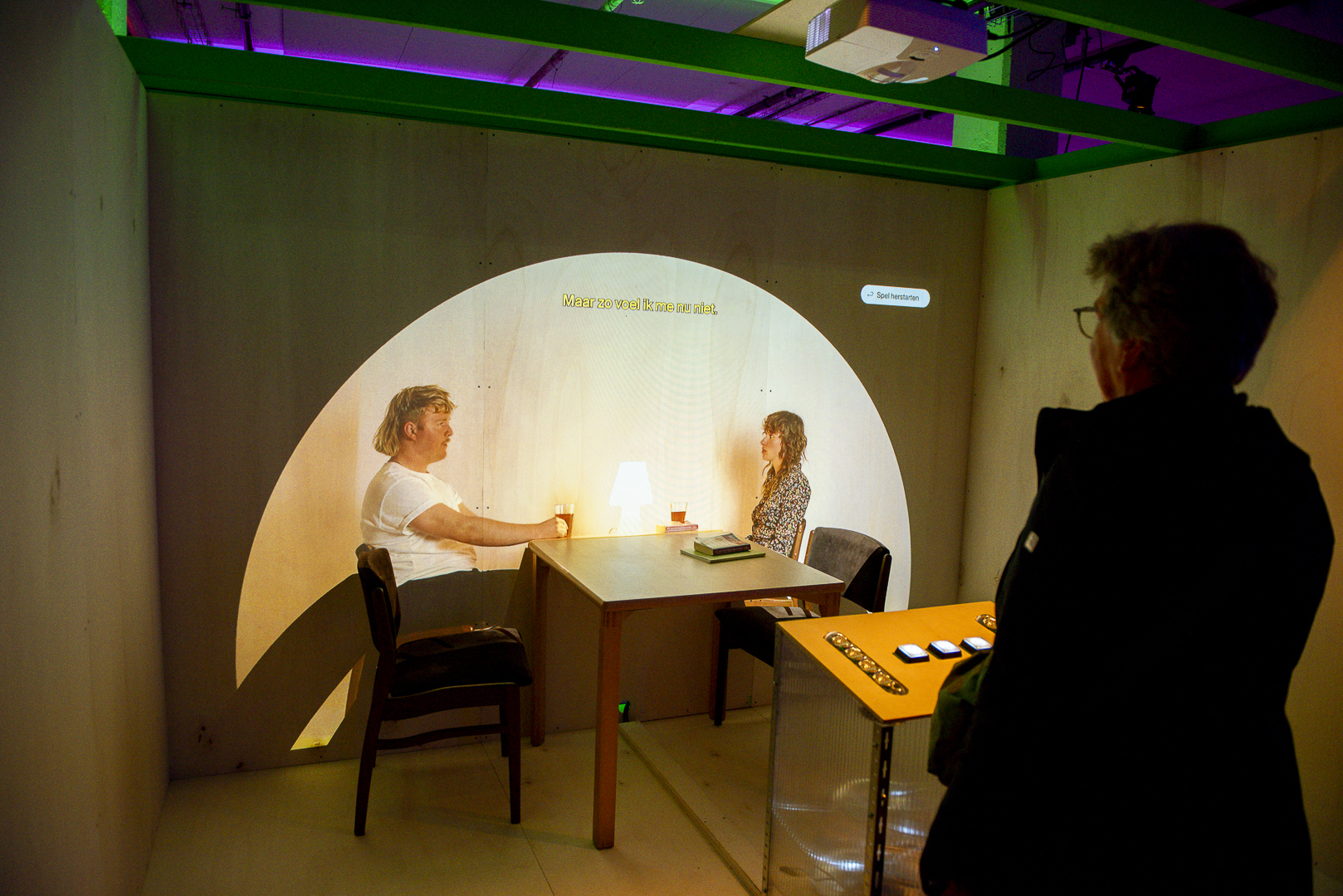Conversation Game
Do you really listen to others?
In a society more obsessed than ever with improving its mental health, rising diagnoses suggest a
troubling paradox. Although we claim to be more connected to more people than ever before, the
numbers show that we feel increasingly alone and less understood by those around us. In a society
characterised by endless distractions and the need to be positive and happy at all times, there seems to
be less space for our negative emotions and less time to truly connect. Although currently seen as
something to be fixed and eradicated, negative emotions are essential to our survival and safeguard our
well-being. Especially in interactions with those closest to us, we are often expected to quickly dismiss
and fix negativity, despite the other person's best intentions. We hear that everything will be fine, that we
should try to get over it, or we are asked if we have tried meditation, read that self-help book or seen a
therapist. Although these suggestions are meant to be helpful, they tell the other person that they need to
be fixed rather than understood. That they are somehow broken from the inside, that it is their fault that
they feel the way they do.
To highlight the importance of listening as a means of creating real connections, Leon and Yash created an interactive film in the style of Netflix's critically acclaimed “Black Mirror: Bandersnatch”. They invite you to join an intimate conversation between two friends as they discuss their innermost thoughts. At various points, the film pauses and asks you to decide how you want to respond. By choosing how to react, the installation teaches players how to engage in meaningful conversation and how it feels to be curious about negativity. Instead of avoiding distress, players learn to accept it as a normal, expected and understandable response to circumstances. Being curious about other people's distress is the most effective way to be helpful, even though it may feel like the opposite. Leon and Yash try to create awareness of how we interact with each other and how our seemingly subtle reactions can change the way others feel. So the next time you have a conversation with someone close to you, you will be able to show curiosity about negativity, even if it feels daunting in a society geared only towards happiness.
To highlight the importance of listening as a means of creating real connections, Leon and Yash created an interactive film in the style of Netflix's critically acclaimed “Black Mirror: Bandersnatch”. They invite you to join an intimate conversation between two friends as they discuss their innermost thoughts. At various points, the film pauses and asks you to decide how you want to respond. By choosing how to react, the installation teaches players how to engage in meaningful conversation and how it feels to be curious about negativity. Instead of avoiding distress, players learn to accept it as a normal, expected and understandable response to circumstances. Being curious about other people's distress is the most effective way to be helpful, even though it may feel like the opposite. Leon and Yash try to create awareness of how we interact with each other and how our seemingly subtle reactions can change the way others feel. So the next time you have a conversation with someone close to you, you will be able to show curiosity about negativity, even if it feels daunting in a society geared only towards happiness.
About the designers

Leon van Klaveren (1998)
Driven by the personal urgency of seeing close acquaintances struggle with their mental wellbeing, Leon van Klaveren began a journey to deepen understanding of this pressing issue through his graduation project for his MSc in Strategic Product Design. He worked with Redesigning Psychiatry, a collective of psychiatrists, sociologists, philosophers and designers, and was mentored by Prof. Dr Ir. Dirk Snelders and Prof. Matthijs van Dijk. He envisioned a project that would delve deeper into the complexities of modern society's culture and its impact on our mental health.
His journey explored six possible directions and concepts, one of which was the realisation that the constant pressure to remain positive was suffocating the space for negative emotions, potentially exacerbating mental health issues. This understanding led to the concept of "One on One", an anti-social media application that aims to foster deeper, more meaningful relationships by encouraging users to embrace and explore not only the pleasant but also the unpleasant emotions, in an effort to truly understand rather than hastily 'fix' the other.
Yash Khinvasara (1997)
With a background in architecture, Yash uses his deep understanding of design principles to foster human connections through empathetic design. With a personal connection to the project's narrative through lived and observed experiences, Yash found resonance with Leon's vision. Recognising the opportunity to make a meaningful contribution to the field of mental health design, Yash eagerly lent his experience and knowledge of empathetic design to Leon van Klaveren's thesis project.
The Collaboration
The installation, presented at Dutch Design Week, is a synthesis of Leon and Yash's expertise and shared concern about the escalating mental health problems, especially among young adults. It reflects a careful study of the systemic issues underlying this worrying trend and offers a counter-narrative that respects and accommodates negative emotions rather than tries to suppress them.
As part of the exhibition, they've developed an interactive film that urges individuals to adopt a more nuanced approach to mental wellbeing, encouraging a deeper understanding and acceptance of negative emotions, rather than focusing solely on the positive. The designers invite you to engage with this installation in the hope that it will foster more genuine connections and a healthier approach to dealing with the inevitable stressors of modern society.
Driven by the personal urgency of seeing close acquaintances struggle with their mental wellbeing, Leon van Klaveren began a journey to deepen understanding of this pressing issue through his graduation project for his MSc in Strategic Product Design. He worked with Redesigning Psychiatry, a collective of psychiatrists, sociologists, philosophers and designers, and was mentored by Prof. Dr Ir. Dirk Snelders and Prof. Matthijs van Dijk. He envisioned a project that would delve deeper into the complexities of modern society's culture and its impact on our mental health.
His journey explored six possible directions and concepts, one of which was the realisation that the constant pressure to remain positive was suffocating the space for negative emotions, potentially exacerbating mental health issues. This understanding led to the concept of "One on One", an anti-social media application that aims to foster deeper, more meaningful relationships by encouraging users to embrace and explore not only the pleasant but also the unpleasant emotions, in an effort to truly understand rather than hastily 'fix' the other.
Yash Khinvasara (1997)
With a background in architecture, Yash uses his deep understanding of design principles to foster human connections through empathetic design. With a personal connection to the project's narrative through lived and observed experiences, Yash found resonance with Leon's vision. Recognising the opportunity to make a meaningful contribution to the field of mental health design, Yash eagerly lent his experience and knowledge of empathetic design to Leon van Klaveren's thesis project.
The Collaboration
The installation, presented at Dutch Design Week, is a synthesis of Leon and Yash's expertise and shared concern about the escalating mental health problems, especially among young adults. It reflects a careful study of the systemic issues underlying this worrying trend and offers a counter-narrative that respects and accommodates negative emotions rather than tries to suppress them.
As part of the exhibition, they've developed an interactive film that urges individuals to adopt a more nuanced approach to mental wellbeing, encouraging a deeper understanding and acceptance of negative emotions, rather than focusing solely on the positive. The designers invite you to engage with this installation in the hope that it will foster more genuine connections and a healthier approach to dealing with the inevitable stressors of modern society.
What we do at TU Delft
Industrial Design Engineering?
The perspective of people is a key facet of design education and research at the Faculty. In other words,
understanding human needs, abilities and behaviour in an ever-changing world. And applying that
knowledge to design for societal good.
Many of these ideas are taught through the popular Design for Interaction is a long established Master’s
programme with researchers from the Faculty’s
Human-Centered Design Department
active in developing
and teaching courses to the students.
One of those lecturers is
Associate Professor Nynke Tromp –
a founding member of Redesigning Psychiatry,
a network of designers, philosophers, researchers, care professionals and experts working on
reshaping the mental health care in the Netherlands.




